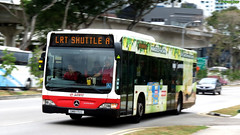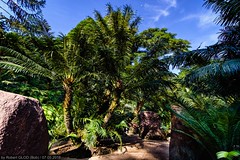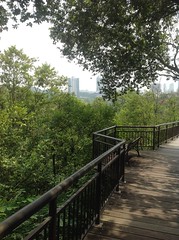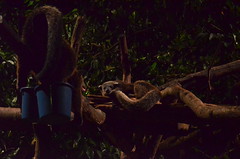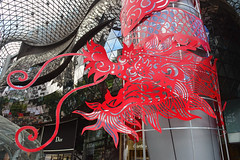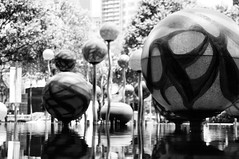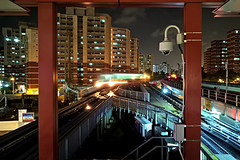 Singapore
Singapore
Singapore (English: /ˈsɪŋ(g)əp/), officially the Republic of Singapore, is an island country and city-state in Southeast Asia.
It is located off the southern tip of the Malay Peninsula, with the Strait of Malacca on its west, the Singapore Strait on its south, the South China Sea on its east, and the Straits of Johor on its north. Singapore lies about one degree of latitude north of the equator (latitudinal and longitudinal coordinates: 1.290270°N, 103.851959°E).
The country's territory comprises one main island, 63 satellite islands and islets, and one outlying islet. The combined area of these has increased by 25% since the country's independence as a result of extensive land reclamation projects.
Singapore has the third highest population density in the world, although there are many green and recreational spaces due to advanced urban planning.
With a multiracial population and respecting the cultural identities of its major ethnic groups, Singapore has four official languages: English, Malay, Mandarin, and Tamil. English is the main language for education and official business or lingua franca. However, many people are bilingual and public services are available in English and the other languages. Multi-racialism is enshrined in the constitution and continues to shape national policies in education, housing, and politics.
Singapore's history dates back at least a millennium, having been a maritime emporium known as Temasek and subsequently as a major constituent part of several successive thalassocratic empires. Its contemporary era began in 1819 when Stamford Raffles established Singapore as an entrepôt trading post of the British Empire. In 1867, the colonies in Southeast Asia were reorganised and Singapore came under the direct control of Britain as part of the Straits Settlements. During World War II, Singapore was occupied by Japan in 1942, and returned to British control as a separate Crown colony following Japan's surrender in 1945. Singapore gained self-governance in 1959 and in 1963 became part of the new federation of Malaysia, alongside Malaya, North Borneo, and Sarawak. Ideological differences, most notably the perceived encroachment of the egalitarian "Malaysian Malaysia" political ideology led by Lee Kuan Yew into the other constituent entities of Malaysia—at the perceived expense of the bumiputera and the policies of Ketuanan Melayu—eventually led to Singapore's expulsion from the federation two years later; Singapore became an independent sovereign country in 1965.
After early years of turbulence whilst lacking natural resources and a hinterland, the nation rapidly developed to become one of the Four Asian Tigers based on international trade and economic globalisation, integrating itself within the world economy through free trade with minimal-to-no trade barriers or tariffs, export-oriented industrialisation, and the large accumulation of received foreign direct investments, foreign-exchange reserves, and assets held by sovereign wealth funds. A highly developed country, it has the second-highest GDP per capita (PPP) in the world. Identified as a tax haven, Singapore is the only country in Asia with a AAA sovereign credit rating from all major rating agencies. It is a major aviation, financial, and maritime shipping hub, and has consistently been ranked as one of the most expensive cities to live in for expatriates and foreign workers. Singapore is placed highly in key social indicators: education, healthcare, quality of life, personal safety, infrastructure, and housing, with a home-ownership rate of 88 percent. Singaporeans enjoy one of the longest life expectancies, fastest Internet connection speeds, lowest infant mortality rates, and lowest levels of corruption in the world.
Singapore is a unitary parliamentary republic with a Westminster system of unicameral parliamentary government, and its legal system is based on common law. While the country is a multi-party democracy with free elections, the government under the People's Action Party (PAP) wields significant control and dominance over politics and society. The PAP has governed the country continuously since full internal self-government was achieved in 1959, with 83 out of 104 seats in Parliament as of the 2020 general election with 61.23% of the popular vote. One of the five founding members of ASEAN, Singapore is also the headquarters of the Asia-Pacific Economic Cooperation (APEC) Secretariat, the Pacific Economic Cooperation Council (PECC) Secretariat, and is the host city of many international conferences and events. Singapore is also a member of the United Nations (UN), World Trade Organization (WTO), East Asia Summit (EAS), Non-Aligned Movement (NAM), and the Commonwealth of Nations.
Name and etymology
The English name of "Singapore" is an anglicisation of the native Malay name for the country, Singapura (Malay: [siŋapura]), which was in turn derived from the Sanskrit word for "lion city" (Sanskrit: सिंहपुर; romanised: Siṃhapura; Brahmi: ???????; literally "lion city"; means "lion", means "city" or "fortress"). A Chinese account from the third century referred to a place as Pú Luó Zhōng , which sounds like Malay for "island at the end of a peninsula." Early references to the name Temasek (or Tumasik) are found in the Nagarakretagama, a Javanese eulogy written in 1365, and a Vietnamese source from the same time period. The name possibly means "Sea Town", being derived from the Malay tasek, meaning "sea" or "lake". The Chinese traveller Wang Dayuan visited a place around 1330 named Danmaxi or Tam ma siak, depending on pronunciation. Danmaxi may be a transcription of Temasek, alternatively, it may be a combination of the Malay Tanah meaning "land" and Chinese Xi meaning "tin," which was traded on the island.
Variations of the name Siṃhapura were used for a number of cities throughout the region prior to the establishment of the Kingdom of Singapura. In Hindu-Buddhist culture, lions were associated with power and protection, which may explain the attraction of such a name. The name Singapura supplanted Temasek sometime before the 15th century, after the establishment of the Kingdom of Singapura on the island by a fleeing Sumatran Raja (prince) from Palembang. However, the precise time and reason for the name change is unknown. The semi-historical Malay Annals state that Temasek was christened Singapura by Sang Nila Utama, a 13th-century Sumatran Raja from Palembang. The Annals state that Sang Nila Utama encountered a strange beast on the island that he took to be a lion. Seeing this as an omen, he established the town of Singapura where he encountered the beast. The second hypothesis, drawn from Portuguese sources, postulates that this mythical story is based on the real life Parameswara of Palembang. Parameswara declared independence from Majapahit and mounted a Lion Throne. After then being driven into exile by the Javanese, he usurped control over Temasek. It is possible that he rechristened the area as Singapura, recalling the throne he had been driven from.
Under Japanese occupation, Singapore was renamed Syonan ([[wikt:昭), meaning "Light of the South." Singapore is sometimes referred to by the nickname the "Garden City", in reference to its parks and tree-lined streets. Another informal name, the "Little Red Dot", was adopted after an article in the Asian Wall Street Journal of 4 August 1998 said that Indonesian President B. J. Habibie referred to Singapore as a red dot on a map.
History
Ancient Singapore
In 1299, according to the Malay Annals, the Kingdom of Singapura was founded on the island by Sang Nila Utama. Although the historicity of the accounts as given in the Malay Annals is the subject of academic debates, it is nevertheless known from various documents that Singapore in the 14th century, then known as Temasek, was a trading port under the influence of both the Majapahit Empire and the Siamese kingdoms, and was a part of the Indosphere. These Indianised kingdoms were characterised by surprising resilience, political integrity and administrative stability. Historical sources also indicate that around the end of the 14th century, its ruler Parameswara was attacked by either the Majapahit or the Siamese, forcing him to move to Malacca where he founded the Sultanate of Malacca. Archaeological evidence suggests that the main settlement on Fort Canning was abandoned around this time, although a small trading settlement continued in Singapore for some time afterwards. In 1613, Portuguese raiders burned down the settlement, and the island faded into obscurity for the next two centuries. By then, Singapore was nominally part of the Johor Sultanate. The wider maritime region and much trade was under Dutch control for the following period after the Dutch conquest of Malacca.
British colonisation
The British governor Stamford Raffles arrived in Singapore on 28 January 1819 and soon recognised the island as a natural choice for the new port. The island was then nominally ruled by Tengku Abdul Rahman, the Sultan of Johor, who was controlled by the Dutch and the Bugis. However, the Sultanate was weakened by factional division: Abdul Rahman, the Temenggong of Johor to Tengku Abdul Rahman, as well as his officials, were loyal to the Sultan's elder brother Tengku Long, who was living in exile in Penyengat Island, Riau Islands. With the Temenggong's help, Raffles managed to smuggle Tengku Long back into Singapore. Raffles offered to recognise Tengku Long as the rightful Sultan of Johor, under the title of Sultan Hussein, as well as provide him with a yearly payment of $5000 and another $3000 to the Temenggong; in return, Sultan Hussein would grant the British the right to establish a trading post on Singapore. The Treaty of Singapore was signed on 6 February 1819.
In 1824, a further treaty with the Sultan led to the entire island becoming a British possession. In 1826, Singapore became part of the Straits Settlements, the…
Looking for places related to Singapore?
Those are other destinations to find places related to Singapore:



